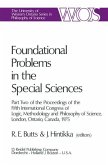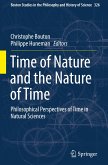EPSA11 Perspectives and Foundational Problems in Philosophy of Science
Herausgegeben:Karakostas, Vassilios; Dieks, Dennis
EPSA11 Perspectives and Foundational Problems in Philosophy of Science
Herausgegeben:Karakostas, Vassilios; Dieks, Dennis
- Gebundenes Buch
- Merkliste
- Auf die Merkliste
- Bewerten Bewerten
- Teilen
- Produkt teilen
- Produkterinnerung
- Produkterinnerung
This book contains a selection of original conference papers covering all major fields in the philosophy of science, that have been organized into themes. The first section of this volume begins with the formal philosophy of science, moves on to idealization, representation and explanation and then finishes with realism, anti-realism and special science laws. The second section covers the philosophy of the physical sciences, looking at quantum mechanics, spontaneous symmetry breaking, the philosophy of space and time, linking physics and metaphysics and the philosophy of chemistry.
Further…mehr
Andere Kunden interessierten sich auch für
![EPSA11 Perspectives and Foundational Problems in Philosophy of Science EPSA11 Perspectives and Foundational Problems in Philosophy of Science]() EPSA11 Perspectives and Foundational Problems in Philosophy of Science112,99 €
EPSA11 Perspectives and Foundational Problems in Philosophy of Science112,99 €![On Gaslighting On Gaslighting]() Kate AbramsonOn Gaslighting18,99 €
Kate AbramsonOn Gaslighting18,99 €![Foundational Problems in the Special Sciences Foundational Problems in the Special Sciences]() Foundational Problems in the Special Sciences77,99 €
Foundational Problems in the Special Sciences77,99 €![Time of Nature and the Nature of Time Time of Nature and the Nature of Time]() Time of Nature and the Nature of Time104,99 €
Time of Nature and the Nature of Time104,99 €![The Structures of Practical Knowledge The Structures of Practical Knowledge]() The Structures of Practical Knowledge150,99 €
The Structures of Practical Knowledge150,99 €![Conquest of Body Conquest of Body]() Polona TratnikConquest of Body38,99 €
Polona TratnikConquest of Body38,99 €![Philip Pettit: Five Themes from his Work Philip Pettit: Five Themes from his Work]() Philip Pettit: Five Themes from his Work39,99 €
Philip Pettit: Five Themes from his Work39,99 €-
-
-
This book contains a selection of original conference papers covering all major fields in the philosophy of science, that have been organized into themes. The first section of this volume begins with the formal philosophy of science, moves on to idealization, representation and explanation and then finishes with realism, anti-realism and special science laws. The second section covers the philosophy of the physical sciences, looking at quantum mechanics, spontaneous symmetry breaking, the philosophy of space and time, linking physics and metaphysics and the philosophy of chemistry.
Further themed sections cover the philosophies of the life sciences, the cognitive sciences and the social sciences. Readers will find that this volume provides an excellent overview of the state of the art in the philosophy of science, as practiced in different European countries.
Further themed sections cover the philosophies of the life sciences, the cognitive sciences and the social sciences. Readers will find that this volume provides an excellent overview of the state of the art in the philosophy of science, as practiced in different European countries.
Produktdetails
- Produktdetails
- The European Philosophy of Science Association Proceedings 2
- Verlag: Springer / Springer International Publishing / Springer, Berlin
- Artikelnr. des Verlages: 86283429, 978-3-319-01305-3
- 2013
- Seitenzahl: 520
- Erscheinungstermin: 30. Dezember 2013
- Englisch
- Abmessung: 241mm x 160mm x 34mm
- Gewicht: 896g
- ISBN-13: 9783319013053
- ISBN-10: 331901305X
- Artikelnr.: 38547400
- Herstellerkennzeichnung
- Springer-Verlag GmbH
- Tiergartenstr. 17
- 69121 Heidelberg
- ProductSafety@springernature.com
- The European Philosophy of Science Association Proceedings 2
- Verlag: Springer / Springer International Publishing / Springer, Berlin
- Artikelnr. des Verlages: 86283429, 978-3-319-01305-3
- 2013
- Seitenzahl: 520
- Erscheinungstermin: 30. Dezember 2013
- Englisch
- Abmessung: 241mm x 160mm x 34mm
- Gewicht: 896g
- ISBN-13: 9783319013053
- ISBN-10: 331901305X
- Artikelnr.: 38547400
- Herstellerkennzeichnung
- Springer-Verlag GmbH
- Tiergartenstr. 17
- 69121 Heidelberg
- ProductSafety@springernature.com
Philosophy of Science.- Formal Philosophy of Science.- 1. Nancy Cartwright: Evidence, Argument and Prediction (Plenary Lecture).- 2. Ilkka Niiniluoto: Models, Simulations, and Analogical Inference.- 3. Doukas Kapantaïs: Intuitionistic Semantics for Fitch's Paradox.- 4. Peter Brössel: Correlation and Truth.- 5. Wolfgang Pietsch: The Limits of Probabilism.- Idealization, Representation and Explanation.- 6. Jaakko Kuorikoski and Petri Ylikoski: How Organization Explains.- 7. Samuel Schindler: Mechanistic Explanation: Asymmetry Lost.- 8. Chuang Liu: Deflationism on Scientific Representation.- 9. Demetris Portides: Idealization in Physics Modeling.- 10. Alisa Bokulich: Explanatory Models vs. Predictive Models: Reduced Complexity Modeling in Geomorphology.- Realism, Anti-realism and Special Science Laws.- 11. Paul Hoyningen-Huene: The Ultimate Argument against Convergent Realism and Structural Realism: The Impasse Objection.- 12. Simon Fitzpatrick: Doing Away with the No Miracles Argument.- 13. Alberto Cordero: Theory-Parts for Scientific Realists.- 14. Samuli Pöyhönen: Natural Kinds and Concept Eliminativism.- 15. Andreas Hüttemann and Alexander Reutlinger: Against the Statistical Account of Special Science Laws.- Philosophy of the Physical Sciences.- Philosophy of Quantum Mechanics.- 16. Richard Healey: How to Use Quantum Theory Locally to Explain EPR-Bell Correlations.- 17. Juan Sebastián Ardenghi, Olimpia Lombardi and Martín Narvaja: Modal Interpretations and Consecutive Measurements.- 18. Foad Dizadji-Bahmani: Why I am not an Everettian.- 19. Nazim Bouatta and Jeremy Butterfield: The Emergence of Integrability in Gauge Theories.- Perspectives on Spontaneous Symmetry Breaking.- 20. Arianna Borrelli and Michael Stöltzner: Model Landscapes in the Higgs Sector.- 21. Koray Karaca: Practical Unification of Solid-State and Particle Physics in the Construction of the Higgs Mechanism.- Philosophy of Space and Time.- 22. Svend Rugh and Henrik Zinkernagel: A Critical Note on Time in the Multiverse.- 23. Daniel Wohlfarth: A New View of "Fundamentality" for Time Asymmetries in Modern Physics.- From Physics to Metaphysics.- 24. Mauro Dorato: How to Combine and not to Combine Physics and Metaphysics.- 25. Kerry Mckenzie: How (Not) to be a Humean Structuralist.- Philosophy of Chemistry.- 26. Paul Needham: What Does Hydrogen Bonding Say About the Nature of the Chemical Bond?.- 27. Robin Hendry: The Metaphysics of Molecular Structure.- Philosophy of the Life Sciences.- 28. Christopher Pearson: Description, Explanation and Explanatory Depth in Developmental Biology.- 29. Bettina Schmietow and Lorenzo Del Savio: Synthetic Genomics and the Causal Role of Genes: What Has Been Shown and Why It Matters.- Biological Knowledge and Structural Realism.- 30. Steven French: Eschewing Entities: Outlining a Biology Based Form of Structural Realism.- 31. Holger Lyre: Must Structural Realism Cover the Special Sciences?.- Philosophy of the Cognitive Sciences.- 32. Lilia Gurova: Principles vs. Mechanisms in Cognitive Science.- 33. Víctor Verdejo: Computationalism, Connectionism, Dynamicism and Beyond: Looking for an Integrated Approach to Cognitive Science.- 34. Lieven Decock and Igor Douven: Qualia Change and Colour Science.- 35. Panagiotis Oulis: Explanatory Coherence, Partial Truth and Diagnostic Validity in Psychiatry.- Philosophy of the Social Sciences.- 36. Uskali Mäki: Performativity: Saving Austin from Mackenzie.- 37. Lisa Osbeck and Nancy Nersessian: Beyond Motivation and Metaphor: 'Scientific Passions' and Anthropomorphism.- 38. Maria Cristina Amoretti and Nicla Vassallo: A Way of Saving Normative Epistemology? Scientific Knowledge Without Standpoint Theories.- 39. Matthew J. Brown: The Democratic Control of the Scientific Control of Politics.- 40. Alejandro Rosas: Harm, Reciprocity and the Moral Domain.
Philosophy of Science.- Formal Philosophy of Science.- 1. Nancy Cartwright: Evidence, Argument and Prediction (Plenary Lecture).- 2. Ilkka Niiniluoto: Models, Simulations, and Analogical Inference.- 3. Doukas Kapantaïs: Intuitionistic Semantics for Fitch's Paradox.- 4. Peter Brössel: Correlation and Truth.- 5. Wolfgang Pietsch: The Limits of Probabilism.- Idealization, Representation and Explanation.- 6. Jaakko Kuorikoski and Petri Ylikoski: How Organization Explains.- 7. Samuel Schindler: Mechanistic Explanation: Asymmetry Lost.- 8. Chuang Liu: Deflationism on Scientific Representation.- 9. Demetris Portides: Idealization in Physics Modeling.- 10. Alisa Bokulich: Explanatory Models vs. Predictive Models: Reduced Complexity Modeling in Geomorphology.- Realism, Anti-realism and Special Science Laws.- 11. Paul Hoyningen-Huene: The Ultimate Argument against Convergent Realism and Structural Realism: The Impasse Objection.- 12. Simon Fitzpatrick: Doing Away with the No Miracles Argument.- 13. Alberto Cordero: Theory-Parts for Scientific Realists.- 14. Samuli Pöyhönen: Natural Kinds and Concept Eliminativism.- 15. Andreas Hüttemann and Alexander Reutlinger: Against the Statistical Account of Special Science Laws.- Philosophy of the Physical Sciences.- Philosophy of Quantum Mechanics.- 16. Richard Healey: How to Use Quantum Theory Locally to Explain EPR-Bell Correlations.- 17. Juan Sebastián Ardenghi, Olimpia Lombardi and Martín Narvaja: Modal Interpretations and Consecutive Measurements.- 18. Foad Dizadji-Bahmani: Why I am not an Everettian.- 19. Nazim Bouatta and Jeremy Butterfield: The Emergence of Integrability in Gauge Theories.- Perspectives on Spontaneous Symmetry Breaking.- 20. Arianna Borrelli and Michael Stöltzner: Model Landscapes in the Higgs Sector.- 21. Koray Karaca: Practical Unification of Solid-State and Particle Physics in the Construction of the Higgs Mechanism.- Philosophy of Space and Time.- 22. Svend Rugh and Henrik Zinkernagel: A Critical Note on Time in the Multiverse.- 23. Daniel Wohlfarth: A New View of "Fundamentality" for Time Asymmetries in Modern Physics.- From Physics to Metaphysics.- 24. Mauro Dorato: How to Combine and not to Combine Physics and Metaphysics.- 25. Kerry Mckenzie: How (Not) to be a Humean Structuralist.- Philosophy of Chemistry.- 26. Paul Needham: What Does Hydrogen Bonding Say About the Nature of the Chemical Bond?.- 27. Robin Hendry: The Metaphysics of Molecular Structure.- Philosophy of the Life Sciences.- 28. Christopher Pearson: Description, Explanation and Explanatory Depth in Developmental Biology.- 29. Bettina Schmietow and Lorenzo Del Savio: Synthetic Genomics and the Causal Role of Genes: What Has Been Shown and Why It Matters.- Biological Knowledge and Structural Realism.- 30. Steven French: Eschewing Entities: Outlining a Biology Based Form of Structural Realism.- 31. Holger Lyre: Must Structural Realism Cover the Special Sciences?.- Philosophy of the Cognitive Sciences.- 32. Lilia Gurova: Principles vs. Mechanisms in Cognitive Science.- 33. Víctor Verdejo: Computationalism, Connectionism, Dynamicism and Beyond: Looking for an Integrated Approach to Cognitive Science.- 34. Lieven Decock and Igor Douven: Qualia Change and Colour Science.- 35. Panagiotis Oulis: Explanatory Coherence, Partial Truth and Diagnostic Validity in Psychiatry.- Philosophy of the Social Sciences.- 36. Uskali Mäki: Performativity: Saving Austin from Mackenzie.- 37. Lisa Osbeck and Nancy Nersessian: Beyond Motivation and Metaphor: 'Scientific Passions' and Anthropomorphism.- 38. Maria Cristina Amoretti and Nicla Vassallo: A Way of Saving Normative Epistemology? Scientific Knowledge Without Standpoint Theories.- 39. Matthew J. Brown: The Democratic Control of the Scientific Control of Politics.- 40. Alejandro Rosas: Harm, Reciprocity and the Moral Domain.








